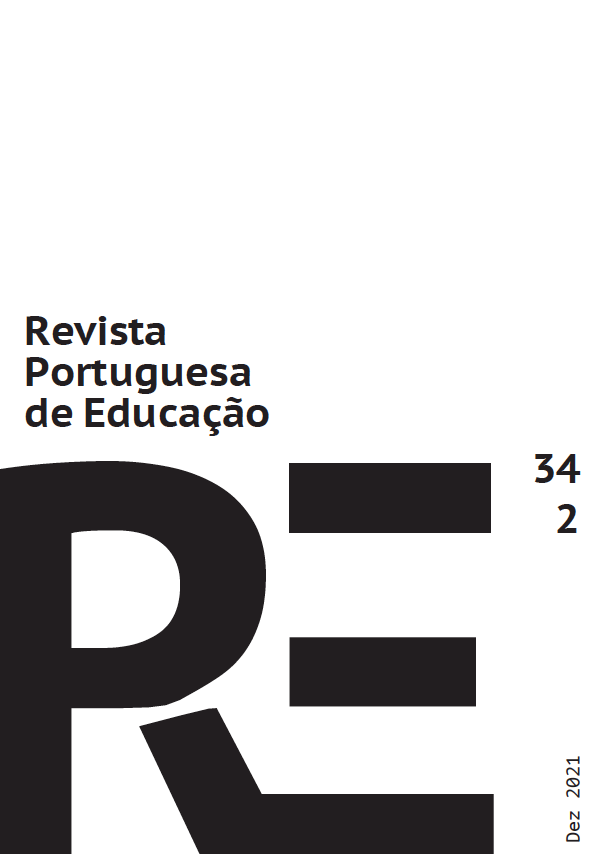Pedagogical strategies in distance education: A look from different contexts
DOI:
https://doi.org/10.21814/rpe.18550Keywords:
Pedagogical strategies, Distance EducationAbstract
The goal of the present article is to present the mapping, creation and application of pedagogical strategies (PS) focused on Distance Education (DE) in different contexts. For that, extension courses were used in different areas, which dealt with socio-affective aspects of distance education, m-learning and digital inclusion of the elderly. The need of this investigation arises from the fact that the concept of pedagogical strategies is usually broad and often inaccurate. Although some studies do use the term, few authors discuss its meaning and application. Based on these, this article presents a definition of pedagogical strategies, as well as implementation situations in distance education. In this approach, PS can be considered as a set of actions put into practice by the teacher to achieve an education-aimed goal. The methodology used to carry out this research was a multiple case study of the qualitative type. Data collection was based on the development, application and evaluation of pedagogical strategies used in extension courses. From the analysis of the data, it was possible to map different strategies and verify the pertinence in their adequacy, according to the context and profile of each audience. Based on the studies we carried out, we can conclude that the pedagogical strategies need to be constantly evaluated, mainly due to the transformations that can occur with the inclusion of new digital technologies in the virtual context, in addition to the heterogeneous profile of the students.
Downloads
References
Amaral, C. B. (2017). Estratégias pedagógicas para o ensino fundamental: Um enfoque na dimensão socioafetiva [Unpublished doctoral thesis]. Universidade Federal do Rio Grande do Sul, Porto Alegre, Brasil.
Bardin, L. (2010). Análise de Conteúdo. Edições 70.
Behar, P., Machado, L. R., Torrezzan, C. A. W. & Longhi, M. T. (2019). Recomendação pedagógica em educação a distância: Conceitos e elementos. In P. A. Behar (Org.), Recomendação pedagógica em educação a distância (pp. 1-18). Penso.
Cavalcante Filho, A., Sales, V. & Alves, F. (2020) Tutoria e identidade docente na educação a distância. Revista Pemo, 2(1), 1-15. https://doi.org/10.47149/pemo.v2i1.3632.
Longaray, A. (2014) Estratégias para a Educação a Distância: um olhar a partir dos estados de ânimo do aluno [Unpublished master’s thesis]. Universidade Federal do Rio Grande do Sul, Porto Alegre, Brasil.
Marques, A. M., Tanaka, L. H. & Fóz, A. Q. B. (2019). Avaliação de programas de intervenção para a aprendizagem socioemocional do professor: Uma revisão integrativa. Revista Portuguesa de Educação, 32(1), 35-51. https://doi.org/10.21814/rpe.15133.
Masetto, M. T. (2003). Competência pedagógica do professor universitário. Summus.
Matoski, A., Veiga, B. P., Silva, M. T. Q. S., Ribeiro, D. G. F. & Alberti, M. E. (2020). Uso de dispositivos móveis como ferramenta de aprendizado: Riscos e oportunidades/ Use of mobile devices as a learning tool: Risks and opportunities. Brazilian Journal of Development, 6(1), 4673-4687. https://doi.org/10.34117/bjdv6n1-335.
Meirelles, F. S. (2021). Pesquisa Anual do Uso de TI. FGV - Fundação Getúlio Vargas. https://eaesp.fgv.br/ensinoeconhecimento/centros/cia/pesquisa.
Ribeiro, A. C. R. (2019). MP-SocioAVA: modelo pedagógico com foco nas interações sociais em um ambiente virtual de aprendizagem [Unpublished doctoral thesis]. Universidade Federal do Rio Grande do Sul, Porto Alegre, Brasil.
Sales, G. L., Cunha, J. L. L., Gonçalves, A. J., Silva, J. B. & Santos, R. L. (2017). Gamificação e Ensinagem Híbrida na Sala de Aula de Física: Metodologias Ativas Aplicadas aos Espaços de Aprendizagem e na Prática Docente. Conexões: Ciência e Tecnologia, 11(2), 45-52. https://doi.org/ 10.21439/conexoes.v11i2.1181.
Souza, P. (2012). Aprendizagem Colaborativa em Ambientes Virtuais de Aprendizagem. In C. Maciel (Org.), Ambiente Virtuais de Aprendizagem (pp. 121-159). MEC.
Souza, A.R., Sartori, A. & Roesler, J. (2008). Mediação pedagógica na educação a distância: Entre enunciados teóricos e práticas construídas. Revista Diálogo Educacional, 8(24), 327-339. http://dx.doi.org/10.7213/rde.v8i24.3850.
Viana, J. & Peralta, H. (2020). Aprender na era digital: Do currículo para todos ao currículo de cada um. Revista Portuguesa de Educação, 33(1), 137-157. https://doi.org/10.21814/rpe.18500.
Downloads
Published
How to Cite
Issue
Section
License
Copyright (c) 2021 Portuguese Journal of Education

This work is licensed under a Creative Commons Attribution-ShareAlike 4.0 International License.
1. The authors preserve their authorship and grant the Portuguese Journal of Education the right to the first publication. The work is licensed under Creative Commons Attribution License that allows sharing the work with the acknowledgment of initial authorship and publication in this Journal.
2. The authors have the right to take additional contracts separately, for non-exclusive distribution of the published version of their work (e.g. to deposit in an institutional repository or as a book chapter), acknowledging the initial authorship and publication in this Journal.
3. The authors have the permission and are stimulated to post their work online (e.g. in an institutional repository or on their personal website). They can do this at any phase of the editorial process, as it may generate productive changes, as well as increase impact and article citation (see The Open Citation Project).
The work is licensed under Attribution-ShareAlike 4.0 International (CC BY-SA 4.0)




















